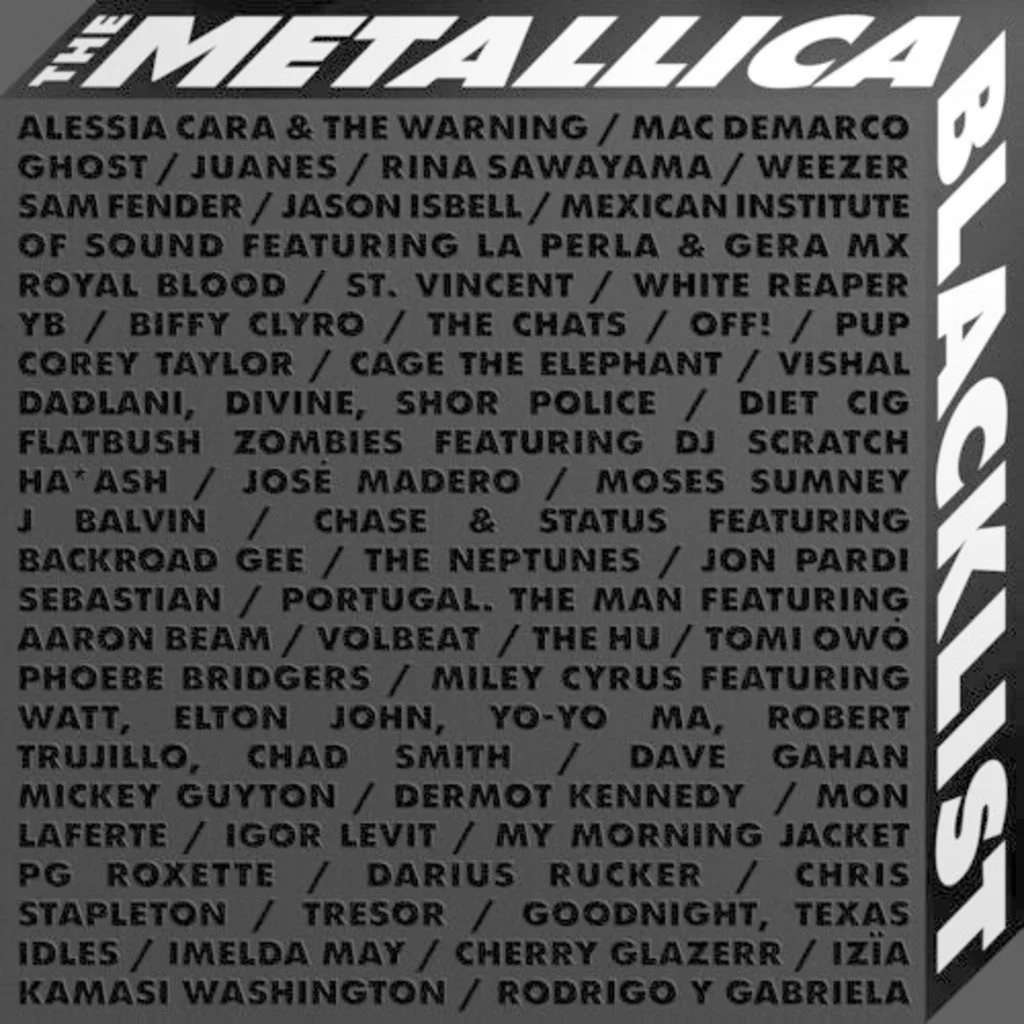5 Business Lessons from Metallica’s School of Hard Rock
I don’t know if you’ve seen this, but Metallica just entered the top 10 on Spotify’s music charts with a song they recorded way back in 1986. What the f*** is going on here??
Did these metal gods sell their souls to the phantom lord to make this miracle happen? Or could it be that these four music industry veterans actually might have a couple or three things to teach us about staying relevant 40 years into their career?
In this article, we’ll break down 5 lessons from Metallica’s dominance of the rock world that you can apply in the boardroom.
Stranger Things
First things first - Let’s address the 10,000 decibel elephant in the room - how did Metallica’s 1986 song “Master of Puppets” squeeze its way into the upper stratosphere of the charts amongst the Drakes and Doja Cats that dominate popular culture in 2022?
Blame the kids - It’s of course a byproduct of the “Stranger Things” effect - the hit Netflix series featured main character Eddie Munson ripping out his version of the song in a climactic scene in the season 4 finale. Suddenly, an entirely new generation of hard rockers and TikTokkers discovered the band and sent them to the top of the charts. Defying all the odds, Metallica are more relevant today than ever and they’re writing the playbook for how the music business can thrive in a digital economy.
Lesson 1: Fight Fire with Fire
Upskill and upsell live shows
So there I was, I’d managed to squeeze my way to the front of the moshpit, right in front of the stage.
If you’ve ever been to a Metallica show, you know this is no mean feat. You would also know that Metallica’s live shows tend to feature over the top pyrotechnics to amp up the drama. As the first chords rang out around the stadium and the song built up to its climax, I braced myself for the flames, but then… nothing. In place of the fireworks, there was an elaborate laser show.
And believe it or not, this brings us to the first key business lesson we can learn from Metallica
When the music business went digital, CD sales went away and bands turned to live performance as their bread and butter source of income. Metallica did three things particularly well:
They increased touring frequency to capture a larger slice of the growing live music pie
They streamlined their live shows. Expensive fireworks out, lasers in. Bulky, expensive amps and sound equipment were replaced with digital emulators. With the new lean, mean touring machine, Metallica were able to take their show to new markets
They took their live shows online via LiveMetallica.com, Youtube and Amazon Prime. These new revenue sources turned out to be pandemic proof - when every other artist was grounded, Metallica were still pulling down streaming revenue from their live shows. They doubled down with a livestreamed pandemic performance for their charitable foundation, complete with audience members beamed in over the internet
All of these measures earned them a place in the top 10 highest grossing live acts on the planet in the last decade
Metallica perform a livestream for charity during the pandemic. Source: Metaltalk
Lesson 2: Welcome home
Build an experimentation hub
When special occasions like birthdays and Christmas roll around, my brother and I don’t go to Amazon to buy gifts for each other, we go to the Metallica.com online store.
In 2002, Metallica established HQ, a giant warehouse facility in the San Francisco Bay Area. As well as housing rehearsal and recording studios for the band, HQ acts as the hub for a number of Metallica’s peripheral businesses. They launched their own record label, have built a loyalty program with 1.2 million members and of course their e-commerce store generates $39m each year
The underlying principle behind the businesses that run out of HQ is to allow experimentation that generate the ultimate level of fan service. The loyalty program has amassed huge amounts of first party data that inform decisions on product, touring itineraries and services to personalise the end-to-end customer experience. For example, they included fans in their classic album reissue campaign by crowdsourcing photos and bootleg recordings that were then used in the official releases.
INTERLUDE: That Napster story
The music business is often used as a case study of disruption
As Jimmy Iovine said in The Defiant Ones, “I’m not going to be the guy who sold the last CD”. He was right, music revenues in the US have fallen 70% since their peak in the late 90s
So what happened in 1999 that caused this massive disruption?
We were all talking about the Y2K bug over ICQ, fashion was split between black leather and bikinis and the music industry was about to be obliterated by a couple of nerds in a dorm room. Metallica were hanging out one afternoon in 99 when one of their songs came on the radio. Not unusual, except for one thing - the song they were hearing was still unfinished; they were still sitting in the studio putting the finishing touches on that very song which was slated to appear in the Mission Impossible 2 soundtrack. They traced the source of the leak back to a file sharing platform called Napster. This spelled trouble.
What followed was a legal battle that nearly ended Metallica - fans were up in arms, how dare these millionaire rockstars ask us to pay for their music - didn’t they have enough? In the end, Napster lost the battle but piracy won the war - the music industry suddenly found itself without a viable business model and revenues plummeted
And yet here we are in 2022, Metallica are getting billions of online streams and playing to sold out arenas. They didn’t just survive the disruption, they’re thriving.
Comedy site Camp Chaos parodied Metallica with a viral video entitled “Napster Bad”
Lesson 3: Carpe Diem Baby
Go digital to launch new ventures
My first ever paycheque wasn’t working the checkout at McDonald’s, delivering newspapers or waiting tables at the local restaurant. Rather than working a minimum wage job to put myself through University, I ran a Metallica fansite called Beyond Black. The ad revenue the website earned was more than enough to keep me flush with textbooks and burritos. But it turns out I wasn’t the only one profiting from putting Metallica content online.
If you can’t beat ‘em, join ‘em - rather than fighting the world of digital transformation, Metallica have jumped on the wave of change and built out a bunch of entirely new business models. The band that once sued Napster now earns $5.2 million each year from their billion+ Spotify streams. They also have two podcasts and dropped their entire last album on Youtube for free. All of these ventures have been directly aimed at creating net new businesses to replace the lost revenue from traditional music sales.
Lesson 4: All within my hands
Establish partnerships to incubate new offerings
You know that feeling you get when you are lining up to enter the venue for a big rock show? The air is buzzing with the electricity of anticipation as the crowd gathers. This was the feeling I had on an overcast Saturday afternoon in 2013 as I took my seat and settled in to see Metallica do their thing.
The lights went down and the roar of the crowd went up. And then… the screen flickered to life. That’s right, we were sitting in an IMAX theatre, about to watch Through the Never, Metallica’s brand new concert film.
For a band who have succeeded mostly due to their fiercely independent spirit, they have been increasingly willing to explore partnerships as a method to reinvent themselves. Of course their movie partnerships have spanned from feature films to award winning documentaries. But in the last decade they’ve also branched out with a music and lifestyle festival that featured exhibitors of vintage muscle cars and horror movie artefacts, and most recently they teamed up with artists including Phoebe Bridgers, The Neptunes and Weezer to produce a tribute album for charity.
Metallica collaborated with 53 modern day artists to create a tribute album with all proceeds going to charity
INTERLUDE: Would Metallica make the Fortune 500?
Let’s establish just how successful Metallica are in their industry - if they were a corporation, would we even be talking about them?
Would they make the Fortune 500? Yep. With 125 million record sales, they were named by Forbes in the Top 10 earning musical acts on the planet.
Are they critically acclaimed? Do they have the respect of their peers? You bet. They’ve won 8 Grammy awards, and were inducted into the Rock n’ Roll hall of fame in 2009
Hmmm, ok then. Well, what about X-factor? Well, Metallica are actually in the Guinness World Book of Records - they are the only band on the planet to have played all 7 continents in a single calendar year - that’s right they played a gig in Antarctica in 2013!
If Metallica were operating in the corporate sphere, they would absolutely be one of the giants that are taught in business schools around the world
Lesson 5: And Justice for All
Add value to the ecosystem
A few months back I attended a party at a hip nightclub in downtown San Francisco sponsored by Blackened Whiskey, Metallica’s latest unlikely venture.
Sure, it seems like every celebrity these days has their own signature booze brand. But when you have celebs like Kendall Jenner wearing vintage Metallica t-shirts, you know your brand has hit a certain level of mainstream cultural cachet. They’ve managed to identify a number of ecosystem opportunities where the Metallica brand aligns well with others to create value greater than the sum of their parts including a sneaker collab with Vans and even launching their own edition of the iconic Guitar Hero video game. And of course we come full circle as the Stranger Things collaboration has led to sales of limited edition Hellfire Club t-shirts being sold at Metallica concerts at their recent appearance at Lollapalooza.
Takeaways
So there you go, 5 brilliant innovation tactics that have kept Metallica at the top of the rock music mountain for four decades and counting.
But there’s one thing I haven’t told you - the real magic happens when we lay out these 5 tactics on a spectrum. The first thing we see is a healthy innovation portfolio spread across multiple tactics- they’re not just banking on one big bet and crossing their fingers. The second positive is that their innovation is spread across invested tactics that they control themselves (like live shows and their own HQ), as well as divested tactics where they let the market do the heavy lifting (like partnerships and ecosystem plays).
Unsurprisingly, this aligns very well with some of the most innovative companies on the planet - for example the illustration below outlines the innovation portfolio of Google’s parent company Alphabet, which maps neatly to Metallica’s innovation tactics.
Sure, Metallica’s ability to navigate the shifting sands of change in the music business and build an enviable innovation portfolio has made them one of the most enduringly profitable musical acts on the planet. However there has been a more important side effect: the band that has always played by its own rules has managed to navigate disruption, is thriving in a digital economy and has built the blueprint for the next generation to follow.
SOURCES USED IN THE VIDEO
Intro
Metallica Amazon Prime Coda Collection Trailer: https://www.amazon.com/Metallica-40th-Anniversary-Concert-Night/dp/B09P1WJWCP
Metallica Through the Never trailer: https://www.youtube.com/watch?v=2Z-g053X390
European Promo tour video: https://www.youtube.com/watch?v=ugtLKmDbrZA
Setup
Stranger Things clip: https://www.youtube.com/watch?v=yXnk3n-qNrI
Stranger Things - fan reactions: https://www.youtube.com/watch?v=_rweok_sMAY
Stranger Things - Metallica Tik Tok duet: https://www.youtube.com/watch?v=u9OGG5Q4MVw
Metallica @ Lollapalooza 2022: https://www.youtube.com/watch?v=R-XFZOe2LvM
Lesson 1
Moshpit stock footage: https://www.pexels.com/video/people-having-fun-at-a-concert-2022395/
Fight Fire with Fire pyrotechnics: https://www.youtube.com/watch?v=pxx-vgB6CZs
One - Laser show: https://www.youtube.com/watch?v=q00UYKd6Y_s
Rig rundown: https://www.youtube.com/watch?v=P6k2ghtbhoU
All Within My Hands Pandemic concert livestream: https://www.youtube.com/watch?v=7jvDxEZJmPE
Lesson 2
Metallica HQ footage with Brian Johnson https://www.youtube.com/watch?v=Y5C2N1LO-Ms
Meet & Greet: https://www.youtube.com/watch?v=Dt-5-ZoC_Y0
Interlude: Napster
The Defiant Ones Part 4: Source: HBO - https://mediaspace.msu.edu/media/The+Defiant+Ones+part+4/1_kpoagwvq/193946683
Music sales graph: https://www.visualcapitalist.com/music-industry-sales/
Cassette tape rewinding: https://www.pexels.com/video/a-cassette-payer-playing-a-cassette-tape-5927778/
The Matrix: https://www.youtube.com/watch?v=u31OjOPF-ZI
Britney Spears cover: https://www.rollingstone.com/music/music-lists/britney-spears-the-rolling-stone-covers-207308/
Old School computer: https://www.youtube.com/watch?v=h8TQ75dRalE
1999 Music hits compilation: https://www.youtube.com/watch?v=4K_gjt0OIHE
Metallica in the studio: https://www.youtube.com/watch?v=AmDp5f9hcQg
I Disappear music video: https://www.youtube.com/watch?v=ekZTW2r4vb4
Mission Impossible 2 Trailer: https://www.youtube.com/watch?v=vIpqpRuGrq4
60 Minutes Napster report: https://www.youtube.com/watch?v=uV26HjazP7M
Camp Chaos Napster Bad animation: https://www.youtube.com/watch?v=fS6udST6lbE
Lesson 3
It’s Electric Podcast on Apple Music: https://www.youtube.com/watch?v=IbL3gCIxZGA
Spotify Landmark: Metallica https://www.youtube.com/watch?v=_JHNY5_PtOc
1.3 Billion Spotify Streams: https://loudwire.com/metallica-2021-spotify-wrapped-over-one-billion-streams/
Hardwired to Self Destruct music video: https://www.youtube.com/watch?v=uhBHL3v4d3I
Lesson 4
Theatre stock footage: https://www.pexels.com/video/an-empty-movie-theater-7988642/
Some Kind of Monster theatrical trailer: https://www.youtube.com/watch?v=Kf04sdQnysM
James Hetfield Recalls The 2012 Orion Car + Motorcycle Show: https://www.youtube.com/watch?v=hCbNRzBOEyw
Kirk Hammett Too Much Horror Business: https://www.youtube.com/watch?v=_gMUtYWo6Tg
The Metallica Black List Trailer: https://www.youtube.com/watch?v=OMeg-relQhM
Interlude: Would Metallica make the Fortune 500?
Metallica album covers animation: https://www.youtube.com/watch?v=L-OF7N1W7NQ
Metallica + Lady Gaga at Grammy awards: https://www.youtube.com/watch?v=R0XUW-sU57g
Metallica Rock n Roll Hall of fame induction: https://www.youtube.com/watch?v=BgrSwealWCs
Freeze ‘Em All interview: https://www.youtube.com/watch?v=0nNx-zgqOfk
Freeze ‘Em All concert: https://www.youtube.com/watch?v=2Hi2u98VKxc
Lesson 5
Kendall Jenner wearing Ride the Lightning t-shirt: https://www.youtube.com/watch?v=fRO5JBzRGUk
Blackened Whiskey ad: https://www.youtube.com/watch?v=nkx2o4rKPWM
Vans x Metallica collab: https://www.youtube.com/watch?v=9Y529dmmZeM
Guitar Hero Metallica trailer: https://www.imdb.com/video/vi1886043417/
Jospeh Quinn meets Metallica: https://www.youtube.com/watch?v=K7JZ6pUNADU
Summary
Flames background animation: https://www.pexels.com/video/burning-firewood-1535674/




